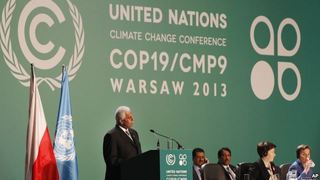 |
| Amy Luers |
"Populations across the globe are beginning to perceive the real or apparent effects of a changing climate. The climate threat is increasingly equated with present-day devastation wrought by storms, floods, wildfires, droughts, and heat waves, rather than abstract catastrophic threats such as a collapse of the West Antarctic ice sheet or the sudden shutdown of the thermohaline ocean circulation (dramatized in the 2004 science-fiction thriller The Day After Tomorrow). "
These events have forced the media to see climate change, "as the magnifying lens through which we view all other problems: food and water, national security, human health, and poverty." As a result "the climate change narrative has changed. A greater number and diversity of actors are aware of and involved in addressing climate change; yet each is motivated by different concerns, driven by different values, and focused on different outcomes. For many, a rise of average global surface temperatures of two degrees Celsius is not a clear line between the acceptable and unacceptable impacts of climate; we are experiencing unacceptable affects from climate today."
But as the authors write while the narrative may have changed "the framework originally set in motion in 1992" has not. The authors argue that "It is time to restructure policy discussions of the climate problem from a simple pollution problem to a more complex risk-management problem. This will mean shifting the goal from averting a global catastrophe to minimizing global collective suffering. This will require: taking on the climate threat as a continuum of risks from variability to change; no longer debating whether any given weather event was the result of climate change; recognizing that stakeholders hold different values and risk perceptions; and addressing climate mitigation and adaptation as truly integrated and equal approaches to managing climate risks. By restructuring the climate challenge as minimizing collective suffering, we may open up new opportunities to address the multiple facets of the systemic risks posed by climate."
It sounds like a more productive approach. Rather than confronting the climate change deniers who may not look at the same facts the same way we could find more opportunities to as the authors challenge us to do, to "minimize global collective suffering."





